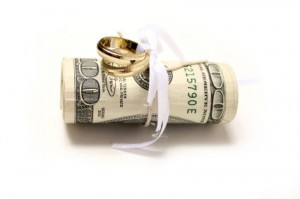We have found the wedding planner’s greatest enemy: The Budget (Dun Dun Dun…)
Every major (and minor!) decision couples will make regarding their wedding revolves around it. The venue, caterer, DJ/Band, decorations, and attire are all determined by it, as is your lifestyle for the months preceding the big day. It makes sense that you should start all of your planning with a solid budget, right? Well… we didn’t.
For months before we got engaged, I was obsessed with a few different venues in the area. Jeremiah had even started talking about locations, flowers, and the suit vs. tux debate long before the ring discussion ever came up.
And then we found it: The Venue of Our Dreams. Trust me, it deserves the all caps. I won’t spill the secret of where it is exactly now… I’ll save that for another day. 🙂
When we got engaged, I felt behind the game . We only had 10 months to plan the wedding, and the average Denver wedding is 14-15 months after the engagement — simply because it takes that long to get the “perfect” venue, caterer, minister, etc. I was panicked, so we started visiting venues right away. We had composed a rough budget, and figured we could afford up to $4000 for the venue. Boy, were we wrong.
We put a hold on a date at The Venue of Our Dreams. We were so excited — if we scheduled on a Sunday, the price was SIGNIFICANTLY under budget: $1700 total, to be exact. We asked the coordinator there to put together a contract, and started planning and imagining every detail accordingly. Little did we know that there would be “little” extra charges: service, alcohol minimums, security, rentals, bartenders, etc. In total, our $1700 venue was going to cost us $5600. Gulp.
We decided to seriously create a budget, and have since come up with a lovely little set of rules to follow:
How Much Do You Have?
- Find out exactly how much you will have by the big day. Plan for having that much 30-60 days BEFORE the day, as many caterers and venues require the final amount around then. Make a realistic annual budget – what’s the difference between how much you make (post taxes) per month and what you spend on your rent/mortgage, utilities, gas, food, student loans, credit cards, car payment, and miscellaneous expenses? Multiply what’s left with how many months you have, and you’ll have your total possible savings. Many computers have programs with a personal budget template — we used that, and edited it to fit our lifestyle more appropriately.
- Subtract any major expenses. For us, they included car insurance premiums, tires, a new water heater (it’s looking pretty rough), taxes on the house, and holiday gifts.
- Be open and honest with your families, and ask them to do the same. Ask if they are willing to contribute to the wedding, and if so, to commit to a set amount or specific item (like the honeymoon or photographer). If they end up doing more, kudos! If not, you’ll be prepared.
- Determine how much of your total amount you’re really willing to spend. I literally want to throw up at the idea of spending $20,000 on one day. Your limit might be higher, or substantially lower.
- Save some for emergencies. You never know when your car’s transmission might go or, heaven forbid, one of you will have to take an unexpected ride in an ambulance.
- Determine your guest list. It’s tough, I know. Estimate how many you think will come (don’t forget that *usually* only 2/3 of the guest list will attend. Budget for ALL of them to attend so you don’t have any nasty surprises later.)
- Create a list of wedding expenses you foresee. You can find them all over the web, but many of them aren’t quite accurate. We used an online calculator, but realized that with our budget, we had $200 for the dress and tux, and $3000 for flowers. Huh?! It also didn’t include the staffing for caterers and bartenders (a HUGE expense… for us it is going to be well over $3000), or the 20% gratuity and 8.1% tax. Be smart and think ahead! What about getting your hair done? The vegetarian meals? That plane ticket for Grandma, since she can’t make the drive? Don’t forget about those extra expenses. And be sure to budget a healthy amount for even more unexpected additions later on down the road…
- Get real estimates. You can find wedding budgeters and advice for budgeting anywhere. The internet can be your greatest friend or worst enemy: Sometimes their “guesstimates” are right on, but they can occasionally be thousands of dollars off. They also don’t account for how many people you’re expecting, or the style of your wedding. The best thing you can do for your budget is call caterers, florists, photographers, etc., and get real-life quotes for your number of guests.
- Try to create connections to venders. One of the deciding factors for having our wedding in Denver was simply the amount of money we would save because we knew people who knew people who knew good venders and would put in a good word. Jeremiah’s dad is an amazing professional photographer, and offered to take and print our photos for the entire weekend. My college roommate’s sister is a florist for a local grocery store — we worked out a deal where she would buy the flowers and supplies at wholesale cost, and both of them would work out the labor to keep costs at a minimum. This same roommate grew up with a now-pastry chef… that takes care of the cake! We have a friend who is an incredible up-and-coming DJ. I told my students about the wedding, and instantly had ten emails from parents that have wedding-world businesses. Don’t be shy to ask around and call out favors (nicely!). It really will pay off.
- Don’t forget the honeymoon! For some people, it isn’t a must-have. It is for us!
- Budget conservatively. Plan for everything to cost at least 10% more than you actually think it will be (or have gotten quotes for). If you end up having some left over, then you can add an extra adventure to your honeymoon or put some toward your new little love nest.



